Retail Sales were a bit disappointing, but equity prices are holding on to their gains.
U.S. equity prices are called higher because of stronger earnings from Intel and J.P. Morgan. Traders got what they were looking for from Intel including higher earnings and revenue growth. J.P. Morgan posted higher profits but there are still problems with loans. Upside momentum is strong but there are still concerns that investors may not chase the higher opening. This could lead to a sell-off early in the session as traders may seek value on dip instead of buying strength.
The surge in demand for higher yielding assets is putting downside pressure on the U.S. Treasury markets. Stronger corporate earnings are a sign that the economy is recovering which brings us closer to higher interest rates. This optimism is creating fear that the Fed may soon announce an exit strategy which would include a plan for a tight monetary policy.
The U.S. Dollar continued to weaken overnight. The weakness was ignited after the U.S. equity market close when Intel reported better than expected earnings. Early this morning, J.P. Morgan Chase reported a $3.6 billion profit triggering a secondary surge to the upside in U.S. equity prices. This helped to fuel greater demand for higher risk assets as traders sold off the Dollar.
Further weakness in the Dollar was triggered by a report which showed a drop in China's exports. This drop in exports was smaller-than-expected and indicated that estimates for third-quarter growth may be revised higher. This interpretation helped speculators drive the Australian Dollar higher on the prospects of increased demand for Australian goods from China.
Pressure on the Dollar is also coming from remarks from Fed Vice Chairman Kohn. In a statement, he warned that the economy is likely to see a moderate recovery. This would keep a lid on inflation and interest rates.
Today's reports include business inventories and FOMC minutes. U.S. Business Inventories may show a slight improvement from August. Later in the afternoon, the FOMC minutes will be released. This report should shed some light as to why the Fed voted to leave interest rates unchanged, and extend its asset-buyback program into early 2010.
The December Euro is getting a boost from greater demand for higher yielding assets. Early this morning new data showed output increased by 0.9%. This report was lower than expected but annual numbers came out in line with expectations. Euro traders once again chose to focus on the future and drove prices through 1.49 for the first time in a year.
The December British Pound continued to march higher following yesterday's technically based closing price reversal bottom. The overnight rally was driven by a report which showed U.K. employers cut jobs at a slower-than-expected pace in September.
The December Canadian Dollar pushed higher overnight. Traders are becoming concerned that Bank of Canada officials may intervene if the Canadian Dollar continues to advance at its current robust pace.
Despite the weakness in the U.S. Dollar, December Gold futures are trading slightly lower. This could be a reaction to a technically overbought market. Traders may feel that prices are too high to chase. This lack of demand may trigger a profit-taking break which should set up a better buying opportunity.
Higher equity prices and the lower Dollar are giving December Crude Oil a boost. Traders are looking for a pick-up in demand because of the developing global economic recovery. Today's crude oil inventory report has to support this speculation or crude oil will retreat sharply.















